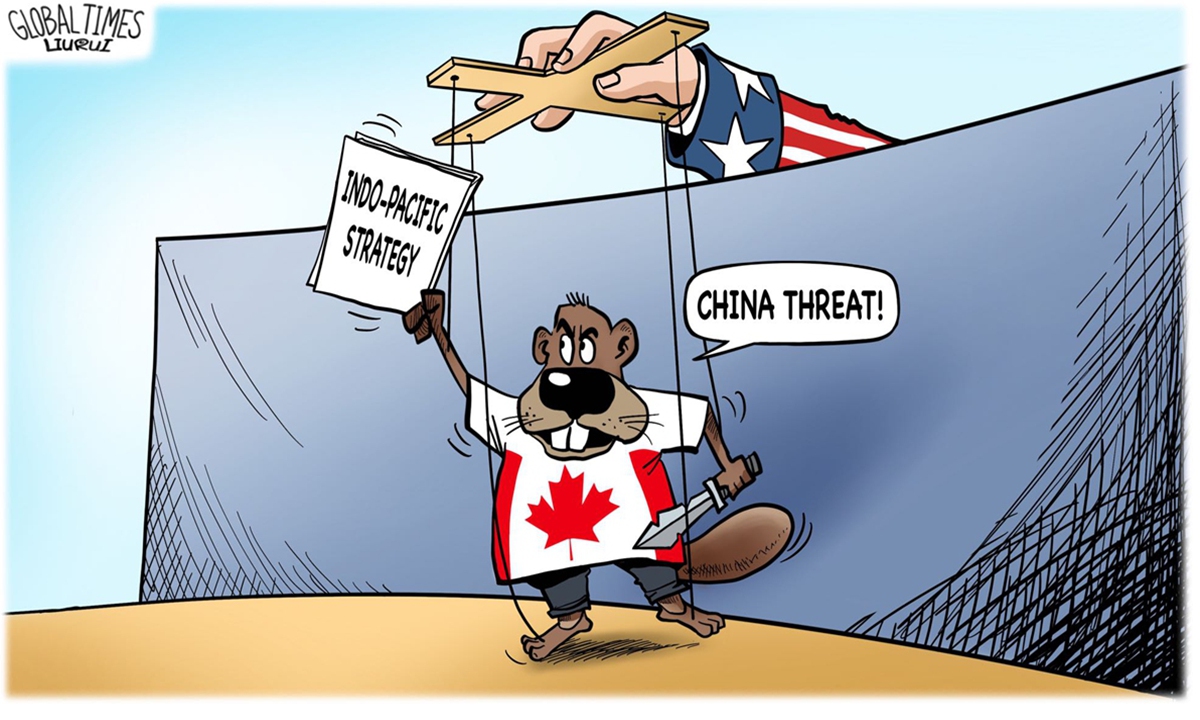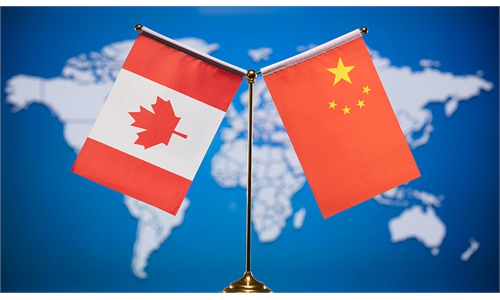
Illustration:Liu Rui/GT
Ottawa has been following Washington's China policy so tightly that it has fallen into a frenzy of Cold War thinking and "values-based diplomacy." This is a regression that abandons a pragmatic and rational foreign policy.
Canada has been getting particularly tough on China recently. First, it followed the US in maliciously hyping the Chinese "wandering balloon" and engaging in clumsy political playacting while obviously targeting China. In the past few weeks, some Canadian politicians and media have sensationalized the claim that China interfered in Canadian federal elections and domestic affairs. On Wednesday, Ottawa said it was aware of China's air and maritime surveillance attempts that were thwarted by the Canadian military.
China has issued several strong and valid responses to these hostile statements and actions from Canada. On Thursday, a spokesman for the Chinese Embassy in Canada refuted the claim about China's interference in Canada's internal affairs, calling it "pure smear and slander" and expressing "strong dissatisfaction and firm opposition." China has also made a detailed explanation of the balloon incident, but Canada still overreacted with belligerence.
China-Canada relations are already at a low point due to the lack of political consensus. The economic and trade cooperation between the two has been unable to break through the bottleneck. And the two countries have also faced an impasse in consultations on major international issues.
Against this backdrop, some Canadian forces are still sparing no effort to smear China, pushing Ottawa to increase its hostility toward Beijing, disregarding the two countries' previous common understanding of cooperation. This has significantly undermined the political trust between the two which is at a low ebb. The current plight in China-Canada relations has long been a victim of Canada's partisan struggle.
Ottawa has shown an apparent tendency to offer an increasingly assertive posture toward China since the launch of its Indo-Pacific strategy, a vision full of provocations against China. For example, it calls China "an increasingly disruptive global power." Clearly, treating China as a threat and a challenge is and will be the main tone of Canada's China policy for a long time.
What is behind such assertiveness is clearly the US. In fact, it is the US government that has been encouraging and pushing Canada to stand against China. It has been spreading Cold War thinking and "values-based diplomacy" to its allies, including Canada. As a result, many of these countries suffer from a "pathological change" in their foreign policy: They now act hysterically and impulsively when dealing with China.
Under the influence of Washington, Canada has abandoned independence and practical considerations in its diplomacy. It has also fallen deeply into the dream of a "Justice League" woven by the US, where division is fueled by ideological bias. But this is just Washington's selfish vision to preserve its own hegemony at the expense of its allies.
Ottawa needs to understand that every move it makes under its current misperception of China is paying for the ambitions of the US. If China-Canada relations continue to be stuck in an impasse without any significant improvement, such a situation is in the best interest of the US.
Yao Peng, deputy secretary-general of the Canadian Studies Center of the Chinese Academy of Social Sciences, told the Global Times the US benefits from the current tension in China-Canadian relations the most. Canada will rely more on US imports and become an important part of the US' restructuring of the high-tech industry supply chain. This will reach Washington's goal of further coordinating Ottawa's pace with it and even controlling Canada in many spheres.
It is in the interest of both China and Canada to see more normalcies in bilateral relations, so both sides should focus on pushing their ties to move toward a better direction. Canada needs to meet China halfway to find out more shared values from cooperation - values that will make both countries feel more secure and prosperous.
Seeing the recently warming China-Australia relationship, Ottawa also needs to reflect on itself, as Canada and Australia share many similarities: They are middle powers and close allies of the US.
"With Australia improving ties with China, Canada should reflect more on its diplomatic independence, instead of just following or giving in to the pressure from the alliance, especially from the US," said Liu Dan, a research fellow with the Center for Canadian Studies of Guangdong University of Foreign Studies.

